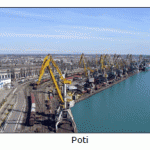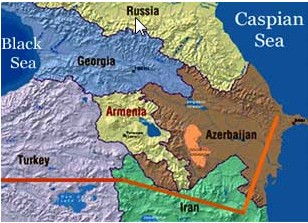
Israeli Ruse Allows Use of Turkish Air Corridor
By Gordon Duff, Senior Editor
A week ago, Israel leaked to the press that they had permission from Saudi Arabia to use their air space to attack Iran. The Saudi’s quickly denied this. The effort on Israel’s part was a ruse to cover their real plans, to attack from the Republic of Georgia, close to Iran’s northern border. However, the breakdown in relations with Turkey after miscalculating the response to their Flotilla raid on a Turkish ship in international waters may have ended this operation.
Israel, whose arms agreements with Turkey mounted to nearly $5 billion dollars over a period of years, had been training pilots in Turkey for bombing attacks on Iran. During these training missions, Israel was smuggling aircraft through Turkish airspace.
Sources indicate that Georgia has become a major transhipment point for narcotics from Afghanistan and other countries in the region. Both a land route through Turkey and into Northern Cyprus and air and sea routes directly into Europe and North America have been cited.
Turkey had allowed Israel to use their air space for training because their terrain closely resembled areas of Iran that Israel planned to attack. However, Turkey was unaware that planes involved in this effort were being relocated to forward staging areas in the Republic of Georgia, making Turkey, technically, fully complicit in this planned illegal attack.
Helping coordinate the attack are intelligence units forward stationed in Azerbaijan, under the guise of technicians, trainers and advisors under the broad armaments agreements with that small nation.
Supply operations, moving necessary ordnance, much of it supplied by the United States under ammunition storage agreements, is being moved through the Black Sea to the Georgian Port of Poti, a major site for exporting coal and manganese ore.
Cover for the supply operations is being performed by the Georgian Coast Guard, set up by Israel and manned with Israeli observers. Their job is to keep Russian surveillance craft away from supply operations under the guise of a “Gaza type” naval blockade of Abkhazia, a separatist province supported by Russia.
Abkhazia and South Ossetia have both separated from the Republic of Georgia and are seeking independence with Russian backing. Georgia attempted to “reattach” South Ossetia with Israeli help in 2008 until Russian forces moved in after the killing of peacekeeping troops by Israeli “commandos.”
 US Naval forces began operating in the Black Sea in late May, with the USS Graple (T-ars 53), a service and salvage ship, visiting the George port of Poti for joint military exercises which ended June 8th. Prior to that, the last US Navy ship in the region was the USS John L. Hall (FFG-32), a Perry class guided missile frigate. A Russian spokesman said, “The US is trying to turn the Black Sea into an American lake.”
US Naval forces began operating in the Black Sea in late May, with the USS Graple (T-ars 53), a service and salvage ship, visiting the George port of Poti for joint military exercises which ended June 8th. Prior to that, the last US Navy ship in the region was the USS John L. Hall (FFG-32), a Perry class guided missile frigate. A Russian spokesman said, “The US is trying to turn the Black Sea into an American lake.”
The US is also maintaining a training and observation command in Tiblisi, a unit from Ramstein AFB in Germany, that is coordinating air traffic and radar functions.
With regular visits by the US Navy scheduled and ramping up at the same convenient time Israel is building up its arms cache in Georgia for the upcoming attack on Iran, the current debacle with Turkey may have set things back or ended this gambit completely. Turkish air controllers had to know something was afoot when the attack bombers failed to return to the agreed upon flight plans and return to Israel.
A critical issue, of course, is the S300 air defense system that Russia has agreed to withhold from Iran as part of the program of sanctions. The current Tor 1 system, though robust, can be defeated by a well planned low level attack. As the use of Georgia may be seen as a provocation by Russia, even if the attacks never manifest as anything other than more “firing blanks” like Israel’s tussle with Hezbollah in Lebanon, Russia may reconsider the delivery of this vital defense technology.
Without the ability to use forward bases in either Georgia, Azerbaijan or Kazakhstan, Israel would be unable to attack Iran at all except by flying a circuitous 4500 mile “each way” route or using the limited capabilities of its nuclear armed submarine off the coast of Iran. It is uncertain how Turkey will deal with the illegal use of their airspace by Israel as relations are already at a low ebb.
With a number of former Soviet airfields spread across Georgia and 4 of 5 fields in Azerbaijan available for operations and support, the region makes a perfect area for broad operations, not only against Iran but for movement of contraband of every variety.

Gordon Duff posted articles on VT from 2008 to 2022. He is a Marine combat veteran of the Vietnam War. A disabled veteran, he worked on veterans and POW issues for decades.
Gordon is an accredited diplomat and is generally accepted as one of the top global intelligence specialists. He manages the world’s largest private intelligence organization and regularly consults with governments challenged by security issues.
Duff has traveled extensively, is published around the world, and is a regular guest on TV and radio in more than “several” countries. He is also a trained chef, wine enthusiast, avid motorcyclist, and gunsmith specializing in historical weapons and restoration. Business experience and interests are in energy and defense technology.
ATTENTION READERS
We See The World From All Sides and Want YOU To Be Fully InformedIn fact, intentional disinformation is a disgraceful scourge in media today. So to assuage any possible errant incorrect information posted herein, we strongly encourage you to seek corroboration from other non-VT sources before forming an educated opinion.
About VT - Policies & Disclosures - Comment Policy




